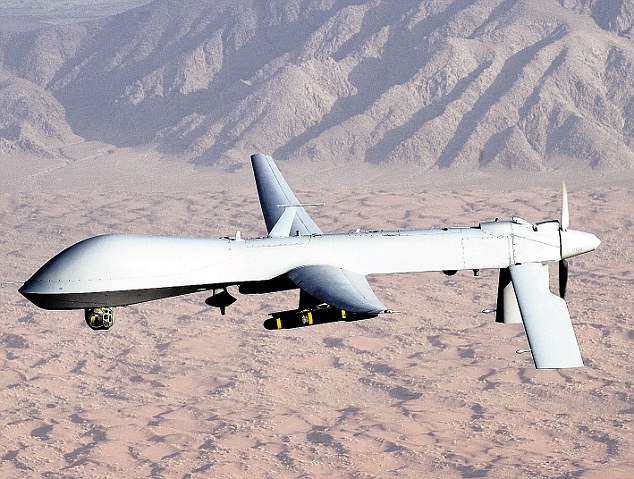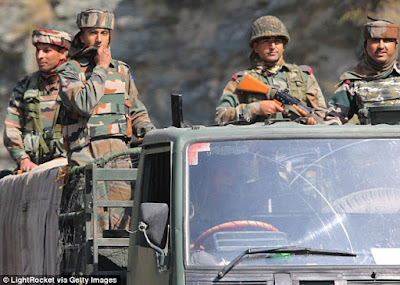Indian Air Force to use combat drones in future surgical strikes to prevent risking soldiers' lives
- IAF is working to upgrade and equip its fleet of Israeli-made Searcher and Heron Unmanned Aerial Vehicles
- It plans to add combat drones to its fleet which can do the same job without risking soldiers’ lives
- Air Force is looking to join hands with the Israel defence major Israeli Aircraft Industry
The Air Force is working to equip its fleet of UAVs with missile capability (Picture for representation)
After using Special Forces troops to attack and destroy terrorist launch pads in Pakistan- occupied Kashmir, India is now planning to add combat drones to its fleet which can do the same job without risking soldiers’ lives.
The Indian Air Force is working to upgrade and equip its fleet of Israeli-made Searcher and Heron Unmanned Aerial Vehicles (UAVs) with missiles under a top secret and classified programme code-named ‘Project Cheetah’.
For the ambitious plan, which is expected to cost almost more than Rs 10,000 crores, the Air Force is looking to join hands with the Israel defence major Israeli Aircraft Industry (IAI).
“Under the project, we are planning to equip our Searchers and Herons with advance snooping capabilities and missiles which can target terrorists and their hideouts both within India and if required, across the borders,” a senior IAF source told Mail Today.
Former IAF vice chief air marshal RK Sharma said ideally when the UAVs can see targets with their surveillance and snooping payloads, they should also have the capability to strike rather than having to deploy other aircraft or assets to do that job.
“If you have such a capability in form of drones, you can take down terrorist targets both within and across the borders,” the former vice chief stated.
With such a capability in its fold, in future scenario if the Army units inform about any particular launch pad of terrorists getting active, the IAF can deploy its armed drones to unleash a silent punishment to terrorists from 30,000 feet over the ground.
A convoy of Indian troopers passing through the border line area in Uri sector
After silently hovering over PoK over suspected launch pads for some time gathering accurate intelligence the drones can launch an attack and return to the base causing greater damage than what the troops can do.
“The precision guided missiles would also help in specific elimination of desired targets and there would be none or minimum collateral damage in such operations," the IAF officer explained.
Officers said the drones can also be put to use in case a terrorist hideout is located in higher reaches in Kashmir where missiles can be safely fired to destroy them without any fear of causing any injury to the civilians.
For turning their surveillance drones into killer vehicles, the IAF has taken a cue from the United States.
For the Americans, drones are the weapons of choice for taking out terrorist leaders or destroying their safe houses.
The Americans regularly smoke out terrorists using their MQ-1 Predators and GlobalHawk as it has killed several more than 2,500 terrorist leaders in Afghanistan and Pakistan alone during its war on terror in these countries.
India, so far, has not used air power in anti-terrorist operations in Jammu and Kashmir or North-east to take out terrorists as a policy to not to be seen being too tough within own areas.
India recently used helicopter gunships to eliminate terrorists who had entered the Pathankot air base but that was within a military station and not in civilian locality.
Unlike India, Pakistan uses its American AH1 Cobra gunships extensively against even suspected civilians as can be seen in its Operation Zarb-e-Azb in Taliban and Baloch areas within its own country.
At the moment, the IAF flies the Israeli-made Searcher II and Heron UAVs for reconnaissance and snooping purposes.
“With the upgrade in snooping capabilities, the forces on ground would also be able to get pin-point intelligence about hideouts in areas where men have to be involved in operations," an IAF source revealed.
The upgrades would also enable the IAF ground station handlers to operate these aircraft from far-off distances and control them through satellite communication system.
The project has been in the works for quite some time and government is also thinking of involving Indian agencies, including the state-owned Hindustan Aeronautics Limited, to use their expertise in the programme.
(Source : dailymail.co.uk)





Post A Comment
No comments :